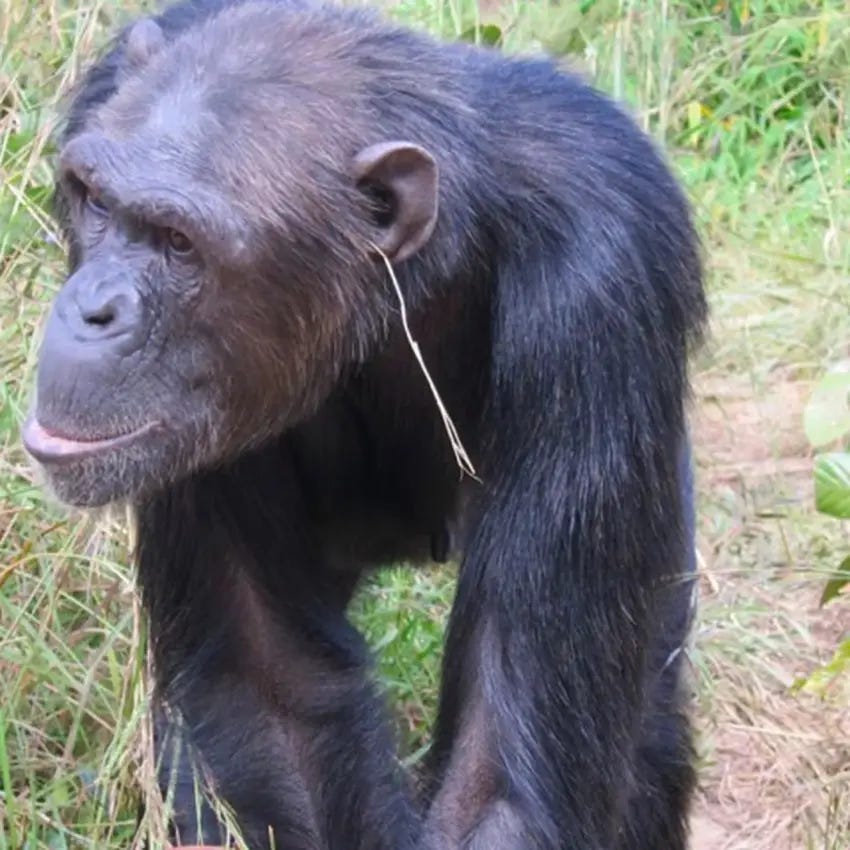A Chimpanzee Style Icon
Forget Sydney Sweeney; check out today's #BeastOfTheDay
Good Morning:
Yesterday on #DogShirtTV, the estimable Anastasiia Lapatina had questions about the political situation in Texas, the estimable Holly Berkley Fletcher’s book is almost here, and the estimable Carol Tsang wanted a definition of totalitarianism. Also, Ava showed up:
Yesterday On Lawfare
Compiled by the estimable Mary Ford
The Case for Reauthorizing CISA 2015
Michael Daniel urges policymakers to swiftly renew the Cybersecurity Information Sharing Act of 2015, explaining that Congress’s failure to reauthorize the statute would threaten the functioning of the U.S. cybersecurity ecosystem.
CISA 2015 has achieved its goals of enabling increased cyber threat information and defensive measure sharing. The original concerns about the statute’s impact have not come to pass. Instead, the law has become foundational to the smooth functioning of the cybersecurity ecosystem. A failure to reauthorize the statute would inject unneeded friction at a time when cyber threats have only increased in their frequency and severity. Information sharing may not be sufficient by itself, but it is a necessary ingredient in successful cyber defense. To be clear, nation-state and criminal threat actors are sharing best practices for exploiting vulnerabilities in the U.S. We should not give them the competitive advantage by allowing this important law to lapse, leaving U.S. entities in an objectively weaker position for effective cyber defense. Congress needs to reauthorize the statute, make it permanent law, and perhaps change the name to reduce confusion. Otherwise, the U.S. will take a giant step backward in its cyber defenses—an outcome that benefits no one except cyber criminals and adversaries.
Poland’s Undelivered Liberal Promises
Tadeusz Koczanowicz discusses the results of Poland’s recent presidential election in which the far-right candidate beat out the liberal candidate. Koczanowicz argues that a united liberal coalition could both solve Poland’s duopoly issue—the tense division between the liberal Civic Coalition and the right-wing Law and Justice party—and help address the political disillusionment among younger voters.
The only hope for creating an alternative to the duopoly on the pro-democratic side lies on the center left, which is in the ruling coalition, and the far left, which opposes the current government. The two parties have basically the same agenda but are in conflict over their relationship to Tusk’s government. The center left, which is in the governing coalition, seeks to achieve a leftist agenda while also remaining critical of some of the government’s decisions, such as suspending the right to asylum. The far left, which is in the opposition, votes against the government and accuses the center left of selling out. The difference is one of political strategy, not ideology, and might be overcome before the next election.
Trump’s Misguided War on Transgender Troops
In the latest installment of Lawfare’s Foreign Policy Essay series, Alexander Downes refutes three of President Trump’s assertions about transgender soldiers made in his executive order barring them from military service: cost to unit cohesion, medical cost to the military, and lack of integrity. Downes explains that there is no evidence to support the president’s claims, and argues that rather than bolstering units’ efficiency and readiness, the removal of transgender troops will have detrimental effects on the military.
Trump’s order offers three reasons why transgender people should be excluded from military service. It posits, first, that transgender soldiers undermine unit cohesion, which is argued to be an essential ingredient of military effectiveness; second, that transgender people are incapable of meeting the military’s rigorous standards and adversely affect readiness; and third, that transgender soldiers lack the honor and truthfulness needed to serve because they are living a lie.
The problem is that each of these claims is false, as I noted when these issues arose when Trump first came into office. Transgender troops have served honorably with no adverse effect on cohesion or readiness for years. The order to remove them from the military is not based on any evidence to the contrary and is thus without foundation.
Podcasts
On Lawfare Daily, I sit down with Anna Bower, Michael Feinberg, Renee DiResta, and James Pearce to discuss the politicization of the Justice Department, the controversy surrounding Alina Habba’s appointment as U.S. Attorney for the District of New Jersey, and agreements between U.S. universities and the Trump administration.
Today’s #BeastOfTheDay is Julie, a chimpanzee style icon known for originating the daring grass-stalk-in-one-ear fashion trend:
First documented in 2014, the grass-in-ear trend has survived Julie’s death and continues to this day, according to a new study published last month. In fact, chimpanzee fashion icons continue to innovate on Julie’s look:
First, during behavioural observations at Group 8 in 2023, we noticed chimpanzees started to engage in the grass-in-ear behaviour (GIEB)… On 16 August 2023 one chimpanzee (Juma) was observed to engage in GIEB, followed by four more individuals within one week. Upon the integration of three immigrants into this group in December 2023, one (Aimée-Love) adopted GIEB by April 2024…
Second, on 27 August 2023, Juma engaged in an unprecedented GIEB variation, namely the grass-in-rectum behaviour (GIRB), which we defined as “putting grass or sticks in one’s rectum and leaving it hanging without manual assistance.” On the same day, we observed Commando engaging in GIRB. Aimi, Congo, and Victoria subsequently engaged in GIRB. Later in the season (7 October), John engaged in GIRB as well. As of April 2025, we have also collected additional GIRB observations for Aimi (N=1) and Victoria (N=4).
This paper actually has important implications for the development of cultural behaviors within social groups, but we love it purely because the authors decided that the phrase “grass-in-ear behavior” required an acronym. That’s beautiful.
In honor of today’s Beast, abbreviate the oddest phrase you encounter today and use it as often as possible.
Keep reading with a 7-day free trial
Subscribe to Dog Shirt Daily to keep reading this post and get 7 days of free access to the full post archives.






